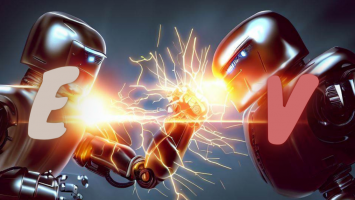Blockchain is a secured digital database that can be accessed by many users simultaneously. Any transaction on the system is stored, checked, and saved in a database for the future. Blockchain focuses on a distributed ledger system rather than a central server, so multiple versions of data may exist throughout the network.
Participants have access to the same version of the data close to real as a single authority or organization does not control it. Transactions may be processed quickly and cheaply because of decentralized administration, and even untrusted parties can agree on the database’s current state. Furthermore, in this article, we will discuss blockchain’s effects and also identify its future.
How does Blockchain Work?
The concept of blockchain is based on the idea that it is a chain of data blocks. The data in one block is used to inform the next, creating a continuous flow of data that links one block to the next. Anybody with access to one of these blocks can monitor the updates to the chain as they occur.
To change the chain without being detected, you would need knowledge of every machine that has ever communicated with the chain, which is impossible. As a result, you may be certain that the data you’re processing is accurate. Also, this implies that there is no longer a need for banks to facilitate transactions. A bank or other financial institution is typically a necessary intermediate when making an online transaction.
What are some of the strengths of using a blockchain?
Blockchain can reorganize established business models and automate certain procedures, freeing up resources for companies toward value-adding activities.
There are other possible advantages for businesses, such as:
Extra Efforts towards Integrity
Blockchain was developed so that many people could access a blockchain system as it was being generated and modified. It also creates a record of all transactions that may be verified afterwards. Consequently, all nodes in the network have access to the same “golden” source of truth, removing the need for a trusted third party to transact business or share information.
Savings on expenses
Blockchain makes it possible for organizations to share resources. There are a few business procedures that need data duplication, such as many rounds of reconciliation. Sharing resources and having faith in the technology might result in cost savings for everybody involved.
Efficiencies in Operations
With smart contracts, a business deal may be carried out simultaneously by all involved parties. Many labor-intensive tasks can be mechanized, releasing personnel for other productive purposes.
Security Improvements
Blockchain secures transactions in a digital database, making the records unchangeable, which inspires confidence among network members in ledger. Unique electronic fingerprints must be confirmed before any modifications are generated using cryptography methods.
Effect of Blockchain Technology on Countries
Blockchain technology can potentially transform many industries, but only some countries agree that it should be used internationally. One country that has fully embraced Blockchain technology is Estonia, which recognizes its transformative potential. The nation has been exploring Blockchain’s potential advantages for at least ten years.
The Estonian government uses blockchain technology in its data registries for various governmental and commercial uses, including the legal system, government services, healthcare, cyber security and banking. The future of Blockchain has been met with great enthusiasm in many other countries, including Switzerland, Sweden, the United States, and South Korea.
It’s important to note that although most countries accept decentralized databases; their views on regulating bitcoin usage vary widely. To promote the positive social effect of Blockchain technology, regulators are working on methods of managing the technology and creating support that won’t restrict its development.
What are the Types of Blockchains?
When looking beyond the underlying technology, blockchain can be broken down into two broad categories: public and permissioned.
A public blockchain is an open and unchangeable record of all the transactions that have ever taken place on a particular network. Because it is based on open-source software, anybody is welcome to join the network and use whatever machine they choose.
Agreeing on the ledger’s state may be time-consuming and resource-intensive due to the massive scope of the network. Digital currencies use the public blockchain like Bitcoin and Ether to record transactions and keep track of ownership.
In contrast, a permissioned blockchain is run by a single entity or group of businesses. Only approved users may join the network, which uses a proprietary algorithm to agree on the current status of the distributed ledger. There are several situations when the network outperforms public blockchains regarding speed. A permissioned blockchain, such as a Quorum, is one kind of blockchain.
Are BlockChains and Cryptocurrencies the Same Thing?
There is potential for cryptocurrencies to play a crucial role in encouraging blockchain’s wide usage. Blockchain technology is at the heart of digital currency. Cryptocurrency’s dependence on blockchain technology binds them.
There is a lot of money involved. According to data compiled by Coinmarketcap.com on October 22, 2021, the market value of all cryptocurrencies combined is over $2.5 trillion, representing more than 6,500 different coins. Bitcoin was officially recognized as legal money for the first time in El Salvador. Blockchain is the underlying technology that powers the digital currency.
Is it Possible for Blockchain to have a Positive Effect on Society?
The potential societal effects of blockchain adoption are vast and include the following:
- Transparency
- Management of the Supply Chain
- Safeguarding Individual Privacy
- Legitimacy
- Trust in Adherence Compliance
Blockchain’s selling point is accountability and provable record keeping, whereas large tech corporations keep their algorithms private. Some in the IT industry believe that blockchain and cryptocurrencies may transform capitalism because of the distributed ledger technology’s peer-to-peer, trustless structure.
What are Some Applications of Blockchain Technology?
Those related to the financial sector uses blockchain technology to enhance current products and reduce operational expenses. The Australian stock market, for example, has just announced that it would begin using blockchain for transaction settlements. The software will keep track of stock certificates and manage equities transaction clearance and settlement.
Abra is another company using blockchain technology to improve its financial services. It is a service that enables people to send money home from abroad using international wire transfers. These transactions may be made in any of 54 various currencies.
Employees are capable of sending money home to their families more quickly and at a lesser cost using the platform than they can do so through traditional service providers such as Western Union, which, according to the World Bank, imposes fees that average 7% of the amount that is moved.
The World Wildlife Fund and three other businesses are working on a blockchain initiative to responsibly obtain tuna from the Ocean. SeaQuest Fiji, tuna fishing and processing business, is working with the blockchain development company ConsenSys and the information technology startup TraSeable to monitor their catch’s origin, status, and sale.
There is a public ledger of all the fish sales made by fishermen, brokers, and retailers like your fish counter or supermarket. Customers may be confident that the tuna they purchase is of high quality and was caught sustainably.
Does BlockChain Become a Widely Utilized Technology?
The blockchain has enormous potential, but it is still in its development. It has to fix three main issues before it can become widely used. Power consumption, computing speed, and blockchain compatibility are all on the list.
- It takes a lot of energy to confirm transactions so that they may be added to the blockchain. A lot of computing power is needed to complete all the calculations and solve equations via trial and error. Technology companies are working on solutions to preserve safety while lowering overall energy usage.
- Processing time is lengthy due to the extensive mathematical calculations required. However, researchers are making efforts to streamline processes and boost transaction volume.
- There are now a large number of blockchains, some public and others private, that are not compatible with one another. This problem will likely get fixed in future blockchain versions.
Blockchain technology can change several markets. It can independently verify and trace transactions.
Blockchain Technology in the Future: Development and Adoption
Several people have communicated effectively between the introduction of blockchain technology and the early days of the internet. This comparison has raised similar worries about the current bitcoin craze.
Countries and companies are racing to adopt Blockchain technology, but it’s still being determined where its wide use will end up. This technology can improve several fields, from the entertainment industry to nonprofits.
Property Rights
The potential of Blockchain technology in the future of real estate and land holdings is that it may assist in successfully storing records on an acquired property, document owning certificates, and give a fair measure of legal and financial security. These are all benefits that could be provided by technology. Additionally, by acting in this manner, we will be able to cut down on the number of dishonest dealings and cons involving real estate.
The smart contract of real estate assets by some Blockchain initiatives makes it possible for many people to own a piece of property for future investment returns.
Healthcare
Integrity and openness are two things that need to be improved in the healthcare system. Blockchain technology can offer transparent and decentralised solutions utilized for keeping track of patients’ medical histories, medications, insurance information, and protections.
Car-Sharing and Rentals
We are all aware of the ridesharing service known as Uber, and while it is a practical choice, the fact that the service is controlled and riders are required to pay a fee to the Uber platform for every successful trip is a significant drawback. Peer-to-peer vehicle rentals and rideshare may become feasible with the use of blockchain technology, which has the potential to bring about a revolutionary shift in the ride-sharing industry.
Education
The usage of blockchain technology in the classroom may ensure the durability of academic documents, including transcripts, degrees, and certifications. It may also offer a more effective way to retrieve information and be used to assist in encouraging achievement recognition. Unbelievably, Blockchain technology has had a huge effect on society.
The Concept of “Digital Identity”
The administration of digital identities in the Blockchain is the focus of several major projects. The use of this technology has the potential to greatly reduce the incidence of identity theft and fraud while simultaneously increasing accessibility. As a bonus, it may reduce the risk of accidental third-party access to private information.
Farms
Blockchain has seen less adoption in the agricultural sector than in other sectors, although there is still movement toward eliminating intermediaries in food production and distribution. Many documents and private databases store food certifications, sustainability, and safety information.
This data storage approach might increase administrative expenses and provide enough room for fraud and wrongdoing. Blockchain technology is a step in the right direction for combating fraud, lowering overhead, and increasing productivity.
Insurance
The insurance industry is one of the many potential beneficiaries of Blockchain technology. Secure technologies can identify industry fraud and organize property insurance claims. It’s also possible that this will make user training for new plans more effective and even make it possible to create a universal coverage system.
Climate, Energy, and the Environment
By increasing user agency over their data and enhancing energy efficiency, blockchain technology has the potential to benefit the industries above. It can also facilitate the open trading of energy stocks between individuals.
Trading
The retail industry is a good fit for blockchain technology. Distributed ledger technology may be used to enhance product tracking throughout the supply chain and to establish the genuineness of products by allowing for the detection of knockoffs through barcode scanning.
Blockchain technology can potentially solve many of the problems that modern banks are already facing in the future. Nowadays, all customer funds and money transactions are managed by banks and their staff. When dealing with humans, there is always the potential for security and honesty failures.
By virtue of their decentralized nature, Blockchain systems are intrinsically highly safe and accessible. It reduces the possibility of performance errors and enables institutions to execute transactions more rapidly and at a lower cost. IBM claims that financial institutions are lined up to embrace the technology.
Blockchain technology and cryptocurrencies provide a strong alternative to using intermediaries like banks to conduct personal financial transactions and manage one’s finances. Anybody who has access to the internet and a computer can create a digital money wallet and transact business on a blockchain, regardless of any governmental oversight or geographical restrictions that may be in place.
Advantages of Blockchain
It is well known that blockchain plays an essential part in cryptocurrency systems such as Bitcoin. It offers a decentralized ledger protected against unauthorized access that records all Bitcoin transactions. Therefore, blockchain technology can assure the correctness of data records while protecting users’ privacy and doing away with the necessity for a third party.
Clarity
Every user in the system can verify the blockchain’s information due to the blockchain’s decentralized nature. As a consequence of this, individuals could have faith in the system as a whole.
However, a conventional database is not accessible since it is centralized. Users are limited to the administration’s published statistics and cannot independently verify any information.
Censorship
Since there is no central authority over blockchain data, it cannot be controlled. Consequently, the network’s functionality is resistant to interference from any entity.
Comparatively, conventional databases have regulatory agencies that control how the system works; these organizations can impose censorship. For instance, a bank may refuse service or temporarily close a customer’s account.
Disadvantages of blockchain
Some Disadvantages of blockchain are the following.
Efficiency and Quickness
Due to the increased complexity of blockchain technology, it is much slower than conventional databases. To start, it uses cryptographic signatures to ensure the authenticity of a transaction. Like other transaction verification systems, blockchain uses an agreement method.
Regarding transaction throughput, confirmation techniques like proof of work tend to be slow. Last but not least, there is redundancy, whereby every node in the network is essential in confirming and storing every transaction.
Changes to the Data
Once data is stored on a blockchain, changing it is a time-consuming and costly process involving rewriting the codes in all blocks. There is no easy way to fix an error or change if anything goes wrong with this functionality.
Pricey Setup and Operation
The blockchain system is more expensive than conventional databases. In addition, organizations need careful preparation and execution when using blockchain technology.
Conclusion
A blockchain is a public, Decentralized ledger that records transactions across several computers. It is done so that the record can only be updated by impacting all future blocks and the network’s agreement.
In addition, the capability of Ethereum and other blockchains to store and run computer code has significantly increased the variety of applications that may be developed with this cutting-edge technology. In this article, we have analysed the blockchain’s effects and also discuss the benefits and drawbacks of using Blockchain technology. We hope you found this article quite informative.




Comments (No)